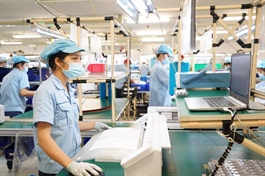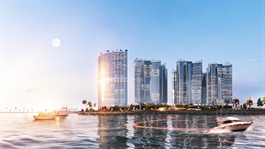Long-standing gains continue with Japan
Long-standing gains continue with Japan
Fresh efforts are being made to remove obstacles for a more transparent business and investment environment, leading to the country remaining a favourite destination for Japanese investors in particular.

Discussing the latest updates involving the long-established Vietnam-Japan Joint Initiative (VJJI), a Ministry of Planning and Investment (MPI) representative said that almost 500 of 600 tasks worked on over the last couple of years have either been completed or are on schedule.
The VJJI has been in force for almost 20 years, and is one of the most effective channels of dialogue between businesses, contributing positively to improving the investment environment in Vietnam.
The agreement was initiated in 2003 and has undergone an 8-phase plan over the past 18 months to tackle various issues. The general objective of the joint initiative has been to support the improvement of Vietnam’s investment environment and competitiveness through policy dialogues between the Vietnamese government, and representatives of Japan business community in this country.
Minister of Planning and Investment Nguyen Chi Dung acknowledged the success of the VJJI thus far. “The results have built confidence for foreign investors to confidently expand activities in Vietnam,” he said at last week’s Vietnam-Japan High-Level Economic Conference.
Nakajima Takeo, chief representative of the Japan External Trade Organization, said that a survey on parent companies in Japan proclaimed the attractiveness of Vietnam as a funding destination, ranking second after the US. It noted that 60 per cent of responded Japanese firms would expand in Vietnam in the next two years.
The VJJI and other efforts from the Vietnamese government have contributed to the current trend of investing and expanding Japanese enterprises. For example, AEON Mall has just started construction of a new shopping centre in the central province of Thua Thien-Hue. With a total investment of more than VND3.9 trillion ($170 million), this will be AEON’s largest commercial centre in Vietnam.
Meanwhile, Fujikin, a manufacturer of fluid control systems such as valves and fittings, has been building a research and development centre in the central city of Danang; and earlier this year, the president of Tenma Corporation arrived in the north-eastern province of Quang Ninh to propose a printer plastic injection mold factory with a scale of $150 million.
Sharp Corporation also plans to expand investment and build one more large-scale factory to produce high-tech electronic products in the southern province of Binh Duong.
“We are looking for some investment opportunities in southern provinces to relocate the supply chain out of China, in addition to two factories in VSIP I and II already,” said the chairman of Sharp Corporation. “We highly appreciate the investment and business climate, infrastructure, and human resources in Vietnam, which are being improved day by day.”
The commitment of these Japanese investors is said to be helped along by the VJJI, the most effective forum among the dialogue and cooperation forums of the two countries’ governments, said Minister Dung.
He added that with the goal of becoming a high-middle-income country by 2030, Vietnam is focusing on the application of sci-tech, promoting innovation, developing a green and digital economy, and much more.
“To implement these goals, we need the companionship of the business community, especially Japanese investments that have great potential and are suitable for the priority areas of Vietnam’s government,” Minister Dung suggested.
“Japanese businesses can recommend or propose Vietnam’s policies, focusing on technology transfer, digital, and green transformation, and innovation. Besides this, we also welcome Japanese firms to participate deeply in implementing mechanisms and policies, as well as help Vietnamese businesses to deeply participate in supply chains,” added the minister.
He further suggested Japanese working groups to coordinate with relevant ministries and agencies of Vietnam and localities to study and implement plans set forth, under the aid of the Japanese government.
“The MPI and other ministries and agencies will continue to accompany the Japanese business community, enhancing the performance and benefits for both sides, contributing to socioeconomic development, and deepening the relationship for the common prosperity of the two countries,” emphasised Minister Dung.
Hideo Ichkawa from Resonac Holdings, and co-chairman of the Vietnam-Japan Economic Committee, also highly appreciates the improvement of Vietnam’s business environment.
“Japan has already cooperated to develop supporting industries, human resources, and propose to build a more favourable investment environment in Vietnam. Celebrating 50 years of diplomatic relations in 2023 will be a turning point that opens up many prospects for cooperation and explores new potentials between the two countries,” said Ichkawa.
According to the MPI, as of date, Japan investors are operating 5,000 valid projects with total investment of about $70 billion, ranking third among 141 countries and territories investing into Vietnam. Vietnam has 104 projects invested in Japan at $19.2 million, ranking 36th among 79 countries and territories that Vietnam firms do outbound investment in.






















